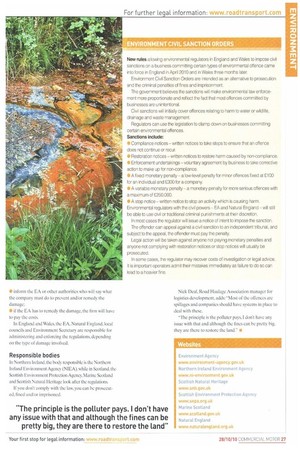New rules allowing environmental regulators in England and Wales to
Page 27

If you've noticed an error in this article please click here to report it so we can fix it.
impose civil sanctions on a business committing certain types of environmental offence came into force in England in April 2010 and In Wales three months later.
Environment Civil Sanction Orders are intended as an alternative to prosecution and the criminal penalties of fines and imprisonment.
The government beleves the sanctions will make environmental law enforcement more proportionate and reflect the fact that most offences committed by businesses are unintentional.
Civil sanctions will initially cover offences relating to harm to water or wildlife, drainage and waste management.
Regulators can use the legislation to clamp down on businesses committing certain environmental offences.
Sanctions include:
Compliance notices — written notices to take steps to ensure that an offence does not continue or recur.
• Restoration notices —written notices to restore harm caused by non-compliance. O Enforcement undertakings — voluntary agreement by business to take corrective action to make up for non-compliance.
• A fixed monetary penalty— a low-level penalty for minor offences fixed at £100 for an individual and MOO for a company.
• A variable monetary penalty — a monetary penalty for more serious offences with a maximum of 2250,000.
• A stop notice — written notice to stop an activity which is causing harm. Environmental regulators with the civil powers EA and Natural England will still be able to use civil or traditional criminal punishments at their discretion. In most cases the regulator will issue a notice al intent to impose the sanction. The offender can appeal against a civil sanction to an independent tribunal, and subject to the appeal, the offender must pay the penalty.
Legal action will be taken against anyone not paying monetary penalties and anyone not complying with restoration notices or stop notices will usually be prosecuted.
In some cases, the regulator may recover costs of investigation or legal advice. It is important operators admit their mistakes immediately as failure to do so can lead to a heavier fine.
























































































































